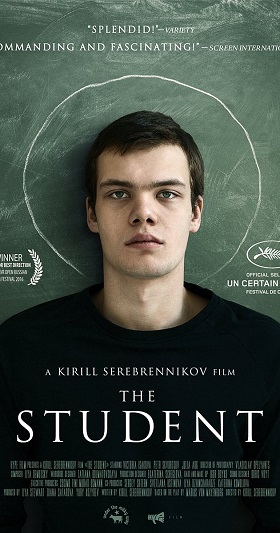[Minor Rock Fist Down]
A simmering meditation on religion, free speech, science, puberty, and malice, The Student (Russian: (M)uchenik) asks a lot of questions yet provides little in the way of answers. Based on Martyr, a play by Marius von Mayenburg, the film takes a look at Christian zealotry, and explores just how far one teenager can take a jihad-esque pursuit of Judeo-Christian faith.
The film opens in modern-day Russia with a mother and teenage son talking about the latter’s refusal to participate in his school’s swimming lessons. Patient and understanding, the mother (Julia Aug) asks her son, Veniamin (Petr Skvortsov), if he’s embarrassed about his body, or is maybe having trouble controlling certain unexpected happenings “downstairs.” After some little reluctance, Veniamin explains that he doesn’t want to strip down to his swimming trunks because it is against his religion. This surprises his mother, who has never taken the young man to church, yet this is no dodge: Veniamin got his hands on a Bible at some point, and has taken to quoting scripture like it’s a new band he’s suddenly into.
Not content to limit his convictions to swimwear, Veniamin hauls his newfound religious zealotry into the classroom as well, and preaches at his science teacher when topics like sex education and evolution come up during lectures. This teacher, Elena (Viktoriya Isakova), tries to reason with him, yet to no avail: Veniamin would rather strip naked in class or jump around in a monkey suit in protest than back down even one inch. The school’s principal doesn’t want any piece of this contentious hot potato, and compromises when confronted with Veniamin’s outbursts. As the film progresses, Veniamin takes advantage of the confusion and trepidation of the adults surrounding him, and only grows more and more confident in his crusade against sin and depravity (as he sees it).
If the motivations of its lead are clear, the overarching point of the picture as a whole is anything but. Veniamin’s mother is a well-meaning, if understandably exhausted woman who just wants the best for her son. She actively listens when she talks to him, and tries a number of different tactics in her pursuit of some sort of common ground between them. Veniamin’s school doesn’t seem to be the source of his troubles, as he isn’t bullied, has an understanding and progressive teacher in Elena, and a weak-willed administration that largely gives him free reign to act out his religious fantasies. Lastly, the local priest tries to harness Veniamin’s convictions towards a productive life as a future man of the cloth, and while the two don’t share the same zealous convictions, it represents yet another person willing to listen to the young man.
Indeed, Veniamin has plenty of people in his life who are willing to listen to his fire and brimstone proclamations, yet he’s never able to find any peace. Is that the point: that millennials are being coddled and allowed to let their adolescent passions run away with them? Or perhaps The Student is a statement about the flexible nature of belief, and how a message of peace and love can be twisted into one of conflict and dictatorial oppression. As Elena says at one point, religious extremism is just another form of totalitarian rule, and is no better than a person like Stalin ordering millions to their deaths because it conforms with a particular brand of justice.
If this is the metaphor for the picture, it is half-baked at best, and sloppy at worst. Those that get in Veniamin’s way are either brushed aside, converted, or destroyed. Without going too deep into the film’s conclusion, there isn’t much in the way of resolution or equanimity for Veniamin and his mini-crusade. Thus, the audience is left with a protagonist who is a bully that does what HE wants while dictating the “proper” lifestyle to all those around him. The educational apparatus doesn’t know how to deal with Veniamin, his mother can’t control him, the church can’t reach him, and the state has no interest in the matter.
And while one could take this whole story as an examination of religious extremism at its earliest stages, it has little to say about what might be done to combat this in burgeoning adults. As mentioned earlier, Veniamin has a mother that cares about him, steadying influences at school and church, and a normal teenage social circle willing to embrace him. What can the audience learn about this kind of fanaticism, and how it can be curbed? If the answer is nothing, then again: what’s the point? That the world is peppered with innately twisted minds that just organically float towards the darkest interpretations of religious texts, be they Muslim, Christian, or Buddhist?
If that’s the case, The Student is not just a depressing film, but a disheartening take on the world and humanity at large. It precludes the notion that we can learn from the most troubled in our societies, that we can be better parents, teachers, and friends of those who would go on to commit horrible atrocities in the name of Allah, Yahweh, or God. Director Kirill Serebrennikov has crafted an engaging picture via some outstanding performances from Aug, Skvortsov, Isakova, and a scene-stealing turn by Aleksandr Gorchilin as Veniamin’s crippled, closeted classmate, yet it’s hard to pull apart the message from all this. Is it an examination of religious extremism set in the east rather than the MIDDLE East, or a look at the evolving notion of modernity in 21st century Russia vis a vis the battle between the state, free speech, and religious autonomy?
It’s hard to say. As a result, The Student is somewhat hard to like.









Comments on this entry are closed.